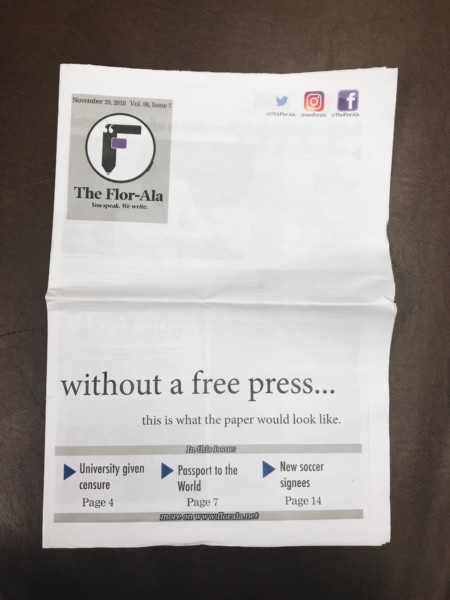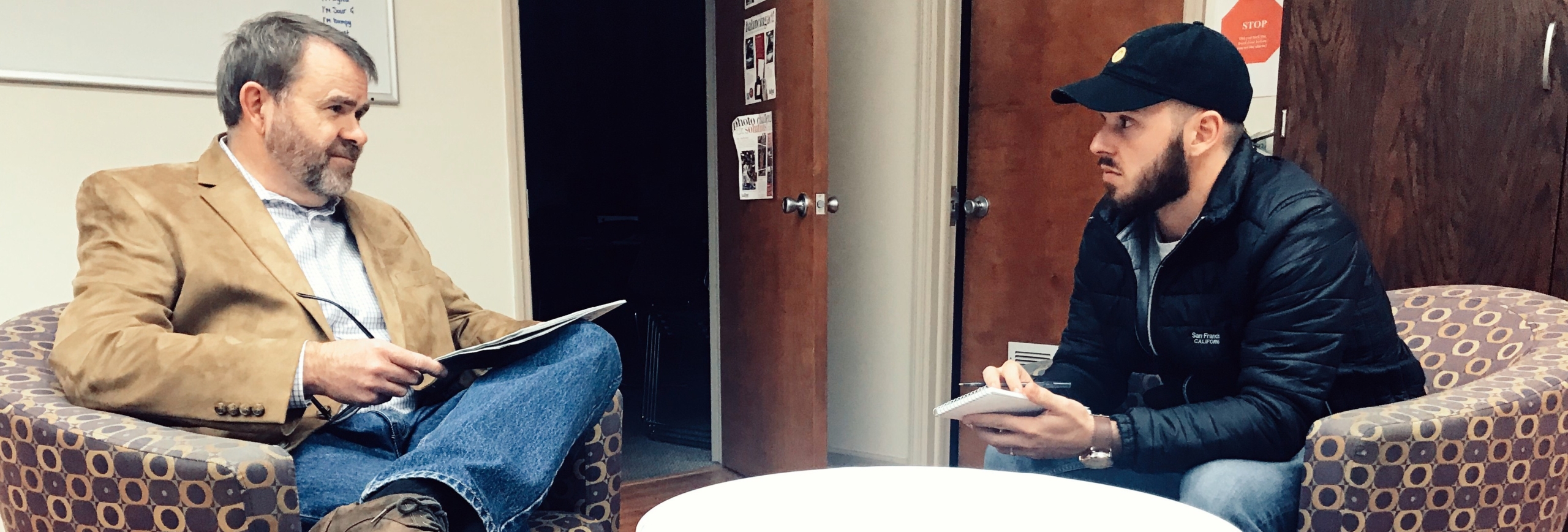Sign up for The Media Today, CJR’s daily newsletter.
Last July, Harley Duncan, editor in chief of the University of North Alabama’s Flor-Ala newspaper learned that the school’s vice president of student affairs had resigned, and a professor had been banned from the college campus. Duncan filed a FOIA request for the two employees’ personnel records to determine the reasons behind their departures; when that request was rejected, the Flor-Ala re-filed, and critically covered the administration’s denial in its pages. The paper eventually obtained selective personnel records; confirmed an investigation of the professor under Title IX, a federal law barring sex-based discrimination in an educational setting; and, in December, reported the professor’s dismissal ahead of other local outlets.
By then, the Flor-Ala had been thrown into turmoil. A week after the article, Duncan and Scott Morris, the student-media adviser for the Flor-Ala, were called before the provost—who, the two say, criticized the article for “several inaccuracies.” Morris, who is 60 and who has worked in newsrooms for half his life, asked for details about the inaccuracies. He received no response. Instead, human resources informed Morris later that the administration was rewriting his job description to require a PhD, which meant he no longer qualified for the position.
“They want student media to operate as public relationships department rather than doing real journalism,” says Morris, who views the change to his job as retribution. Duncan, who began working with Morris more than a year ago and continued to cover the Title IX story, says the former adviser is “somebody I relied on.”
From the archives: A new campaign tries to strengthen the rights of student journalists
The pressures student journalists face aren’t new or uncommon; they’re not even rare. Rather, they underscore the unique vulnerabilities of student journalists, who in many cases do the same critical reporting as professional peers without comparable protections.
Instances of student press censorship often go unreported because advisers fear losing their jobs, and students worry about jeopardizing their advisers.
In the past year, a high-school journalist in Indiana told BuzzFeed News her school had barred her from covering sexual-assault allegations against a student. In Arkansas, a high school suspended publication of its paper for an investigation into football player transfers. (The school district reversed its decision to censor articles after national news coverage brought greater criticism and scrutiny.) In Texas, another high school drew attention for banning editorials published in its school paper, and for a decision to not renew the student-media adviser’s contract, which the Student Press Law Center termed “troubling.”
Reported cases such as these are “the tip of the iceberg,” Chris Evans, president of the College Media Association, says. Instances of student press censorship often go unreported because advisers fear losing their jobs, and students worry about jeopardizing their advisers.
“The adviser is also the institutional memory at the paper because students are transient,” Jonathan Peters, a media law professor at the University of Georgia and a regular CJR contributor, says. “So if you want to disrupt a student news organization significantly, a good way of doing this is by getting rid of the adviser.”
Many of today’s extraordinary restrictions on student journalism are tied to Hazelwood School District v. Kuhlmeier, a 1988 Supreme Court case whose ruling enabled public schools to censor student publications if administrators determined an article to be biased, objectionable, or otherwise unsuitable for students. Press freedom advocates regard the Hazelwood decision as a primary source of problems facing student journalists, favoring the earlier Tinker standard and pushing for state legislation such as New Voices, that expands student-speech protections and helps guard against unwarranted censorship.
“By not having overt protections for student press freedom, there is often more self-censorship,” Hadar Harris, executive director of the Student Press Law Center, says. “New Voices is not only about preventing censorship but it is also about empowering student voice.” (New Voices, which is a non-partisan and student-driven campaign, is spearheaded by the SPLC.)
Five states introduced New Voices legislation this year; last week, a New Voices bill died in Virginia when a committee locked in a 3-3 vote. A former student-journalist adviser in that state who lost her position following critical coverage of her school told officials, “My story would have had a very different ending” had New Voices legislation existed previously. For the third year in a row, Nebraska lawmakers will take up a New Voices bill, and are expected to vote in the coming weeks.
Legislators and school officials worry that “unfettered free speech will lead to irresponsible journalism,” says Evans, who thinks the misconception prevents more states from passing legislation such as New Voices. Between anti-libel, anti-bullying, and privacy-related provisions, Evans believes there are currently sufficient legal protections for student journalists as well as their schools and administrators.
Frank LoMonte, senior fellow at the Student Press Law Center, tells CJR that having second-level protections under state laws ensures that the rights of the student journalists are not violated. New Voices “actually minimizes disputes and facilitates resolving them quickly,” LoMonte says, “because the law clearly lays out everyone’s roles and boundaries.” While there’s no data to prove that protections such as New Voices directly translates to enterprise reporting, LoMonte says states that with additional student-journalist protections are often better represented at journalism competitions.
Last year, a high-school paper in Burlington, Vermont, faced pressure from a principal to take down coverage of a misconduct investigation into a school guidance counselor. News of the censorship attempt, promoted by students via social media, attracted local and national news coverage, and the principal reversed his decision, something Harris and SPLC attribute to New Voices legislation in that state. The Burlington school district later enacted a new student-media policy that enshrined press protections.
The Flor-Ala, by comparison, has no such protections. Alabama has not passed New Voices legislation, and so Morris lacks its protections. The CMA censured the university, placing it on a list of schools that Evans calls “hostile to the First Amendment.”

The front page of The Flor-Ala, published days after the College Media Association censured the University of North Alabama.
In theory, that list should alert people searching for details on the school and its paper to the Flor-Ala incident—bad press Evans hopes might persuade the school to revise its policies and prevent retaliation against the students or their advisors for publishing content that throws the institution in negative light. But the University of North Alabama censure remains in place, three months after it was first announced. Another school remains on the censure list more than a decade after the incident that landed it there.
Often, says Evans, university officials respond to a CMA censure by calling the incident a personnel matter and declining to engage further. “That’s what happened at the University of North Alabama,” Evans says. “They said it is a personnel issue, and clearly it is not.” The university sent CJR a statement calling the censure “unwarranted,” and said it provided CMA with “significant and substantial documentation that supports the timeline of decision-making.” Emails sent by university officials to CMA show conversations dating to 2014 in which school administrators discuss relocating Flor-Ala to a new department but, says Evans, those materials do not mention plans to change the student-media adviser job requirements.
Morris, the embattled Flor-Ala adviser, will remain in his position until the end of the spring semester; the university is looking for a replacement.
“When I resigned as the executive editor of the local daily newspaper to take the student media adviser job, I knew I would always be just one infuriated administrator away from being unemployed,” Morris tells CJR. He had discussed the Flor-Ala’s investigation with his wife, told her he was teaching Duncan how to request records, and explained that the story may cost him his job. Teaching him how to get public records is your job, he recalls her saying. Do your job.
“So,” he says, “I did.”
ICYMI: Teenage journalists memorialize hundreds of gun-violence victims
Has America ever needed a media defender more than now? Help us by joining CJR today.



